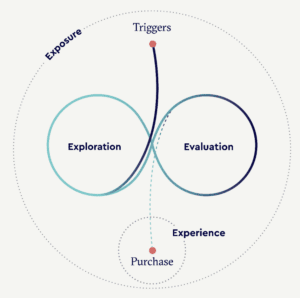What companies tend to overlook in an SEO strategy is the power of informational content.
Most businesses tend to cut corners or neglect to provide users with information to fulfil the sole purpose of just selling their product or service. However, this can greatly backfire when a user is on the quest for some sort of informational content that convinces them to perform a desired action.
Informational content can help with ‘the messy middle’, reaching the user in the most crucial steps of their buying journey. Those moments of deliberation before clicking ‘buy’ are some of the most important. The power of informational content can help sway your users towards purchasing your product.
At Embryo, our expert team creates SEO content that increases the rankings of your site and establishes your authority on the web. Want to know more? Get in touch with us today.
What is informational content?
Informational content is content on a site that is created to educate consumers and inform them about the unique industry/niche – directly meeting the user’s search intent. To meet this intent, the content must always relevant to the topic at hand and to the target audience, with an aim of addressing any and all questions a user may have through long-form blog posts and pages, or even video guides.
Informational content may seek to answer the burning questions that users have and provide them with solutions to their problems, or even a comprehensive beginner’s guide on what you have to offer. While informational, it should also aim to be engaging and easily digestible for a user who may be unfamiliar with your industry.
6 ways informational content benefits SEO
Now you know what informational content is, it’s time to explain why it should be put to use within your SEO strategy. The importance it has for SEO can be demonstrated through these 6 benefits:
1. Internal linking opportunities

Naturally, with more content, you create more internal linking opportunities throughout your site. A solid internal linking structure is key for any high-ranking website. Not only does it help the search engine understand your site’s structure, but it also helps users to navigate your site and find every bit of information they need.
A user shouldn’t need to turn to other sites to answer questions, yours should be the hub of all information and it can become this with informational content. All of your content is likely to rank higher as the internal links strengthen your whole site.
2. Establishes your authority

Informational content shows a good, trustworthy understanding of a topic or niche. It establishes your overall brand awareness by highlighting your site as the ‘go-to’ within that industry.
This type of content also means you follow Google’s E-E-A-T guidelines by stamping your authority onto the SERP and allowing Google to see you as the most helpful site out there- if it sees you in this way, then it will reward you by increasing your ranking. The topical authority that informational content creates allows both Google and users to see that you know what you’re talking about.
3. Rank for long-tail keywords
The more informational the content, the more keyword ranking opportunities that appear. Long-tail keywords often appear when a user is searching for something specific or has a long question that needs to be answered.
Due to the comprehensive nature of your content, you’re likely to hit the keywords the user types into the search engine. Producing content that matches the user’s specific search intent is a win, especially with the introduction of voice search where queries are much more nuanced.
4. The Messy Middle

A linear buying journey typically looks like this: awareness > interest > consideration > purchase. This linearity is becoming increasingly messier with the development of marketing, and informational content can help win your users over as they weigh up all the options based on the information given to them.
At the point of consideration, a user should be persuaded by your relevant and informative content. Informational content makes it more likely to appear within the messy middle instead of getting lost in the sea of content that’s available out there.
Shona Worsman, Embryo’s Senior Content Manager, adds:

“Every person, including you, goes through a complex journey before purchasing a product or ensuring about a service. The buyer’s journey isn’t as linear as once thought.
The constant back and forth between research, comparison, adding to basket, checking reviews, looking at social media, skimming reviews and every other online activity is defined as the messy middle.
Our role in all of this Is to provide the most relevant and useful content for every step. Informational content is perfect for users researching a problem/desire, which eventually leads them onto the next step of their journey.”
5. Link building
When producing high-quality, long-form content, other professional and authoritative sites would likely be happy to link to yours. Your site may also be useful for other content writers, who then link to some important information mentioned in your piece.
The more you cover, the more link-building opportunities are created. This then contributes to your overall image and increases overall domain authority.
6. Increase in organic traffic
An increase and guarantee of organic traffic is more likely with a stream of informational content. An SEO content strategy aims to generate organic traffic, and the more informational content you put out there, the more likely users are to find you and use your useful content.
Want to learn more about how to improve your SEO strategy?
And there you have it! What’s not to love about informational content? Not only does it strengthen the authority of your site, but it can also help boost sales and conversions by reaching users in those crucial moments of the buyer journey. Trust us, it’s well worth implementing into your strategy- its power is not to be undermined.
If you have a question that’s not been covered here, feel free to call us at 0161 327 2635 or email info@embryo.com.
FAQs
Can informational content include persuasive language?
As long as that content is providing all of the informational content as the priority, I don’t see why you can’t include a bit of persuasive language in there. For example, if you have informational content on a guide or process, and then at the end include a CTA on how your business can help, this only adds more value to the piece and is useful to the user.
Should I put informational content into topic clusters?
I would strongly recommend that you do. Topic clusters are just another way of saying that your sub-topics and pages can be grouped into a larger broad category. These show how much knowledge you have on a specific topic, and if done well through site structure and strong internal linking, can overall increase your domain authority.
Is it appropriate to include opinion in informational content?
Things such as FAQs and quotes answered by specialists and experts in the business is what will separate you from your competitors. Make sure that your content stays comprehensive and still matches the intent. Showing that you have expert knowledge within the business is what can be the difference between a reader choosing your business over a competitor.
How does creating informational content increase the chance of getting leads?
Creating informational content shows your audiences that you know your stuff! This theory multiplied by however many pages you are publishing increases trust between your brand and your website user. This applies to all industries no matter what type of product or service you are offering. By showing to Google you are bothered to go that extra mile to provide this useful info and help out a potential customer will also have a positive impact on your domain authority.
How should the retail industry approach informational content marketing?
Being heavily product-centred, creating guides and manuals isn’t always the most effective or needed type of content. Things like product specifications, details, reviews, and user-generated content can be more useful to the user. For example, the highest-performing fashion brands are always the ones with blogs on what is on trend, what accessories to pair clothes with, dresses for event types, etc.















